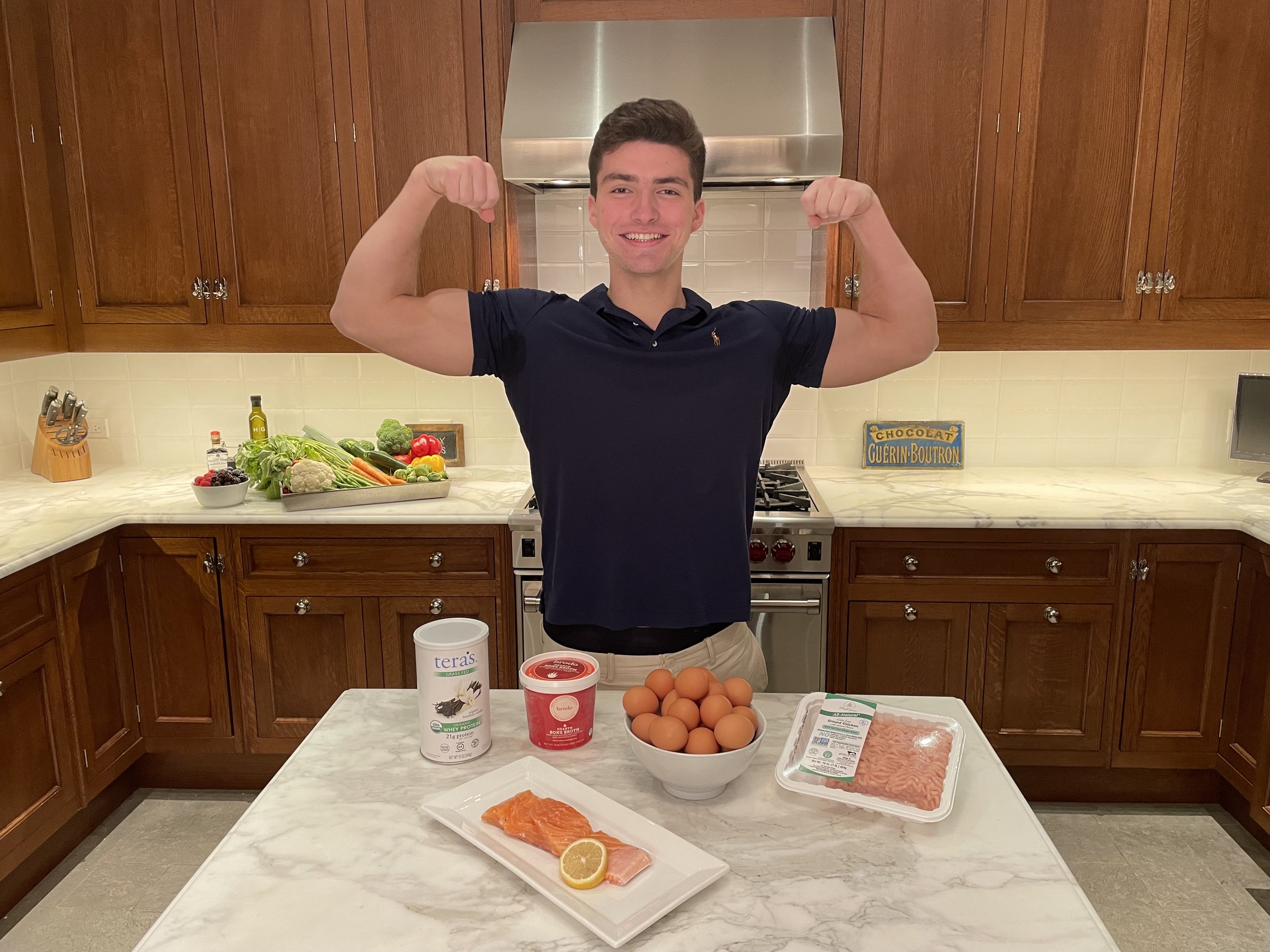Disproving Myths About Protein
Some of my current favorite sources of protein!
Defining Protein:
Proteins do the “work” of DNA and DNA holds the instruction to make more proteins. The backbone of a protein is amino acids. The structure of a protein is contingent upon the functional groups that are bound to the amino acid. Functional groups have different characteristics like polarity and charge. Imagine the amino acid backbone as a straight line. When two functional groups of the same kind are present (i.e, two polar molecules, two negatively charged molecules) they attract each other. They will then fold the straight backbone of the protein so that the two matching molecules can bind together. The change in the structure of the protein will dictate the function.
Black functional groups will attract other black functional groups which creates the ball-like folding
“There’s no such thing as too much protein”
There may be some benefits but at the price of some negative impacts. Dietary protein provides the body with nitrogen through the amine groups on proteins. Your body will use that nitrogen to build muscle, but secrets excess through urine. This means homeostasis is at play: your body is trying to find the equilibrium of nitrogen content. If you consume too much protein without enough exercise, nitrogen will have nowhere to go and build up in the kidneys. The excess can cause very serious damage to the kidney’s regulatory system.
For a long time, I had listened to fitness influences suggest that you need around 1-1.5g of protein per pound of body weight. Although that will give the body a ton of nitrogen to repair torn muscles, it’s not practical and could have major repercussions. The RDA suggests that .45g of protein per pound of body weight is a sufficient amount to build muscle, and they happened to find that there were no additional benefits for people who consumed 1.2g of protein per pound of body weight.
Here’s an awesome source to read more!
“Cutting back protein can help you lose weight”
The most important tactic to cutting weight is to reduce caloric intake. If you eating less protein means that you will eat less food in general, then yes you will lose weight. But trying to cut solely protein will not have any inherent effect on the efficiency in which you lose weight.
Rather, a keto-like diet would —in theory— have a greater weight loss effect. The human body gets its energy from food, specifically, ATP or Adenosine triphosphate. When the body consumes food, it prioritizes what macronutrient it turns into ATP. The easiest route is for your body to turn carbohydrates into ATP, then fats, and lastly proteins. In a keto diet, you reduce or eliminate your carbohydrate consumption. When in a deficiency of carbs, the body will resort to breaking downs fats in ATP, and then proteins in ATP through oxidation. If your body resorts to using proteins to create ATP, you will lose muscle.
There is no perfect diet for losing weight. However, I would never recommend cutting an entire food group out of your diet. Your body will feel best if you eat carbs, fats, and proteins because everything will perform its designated function.
“You have to eat protein 10 minutes after you work out”
Studies have shown that there is no significant upside of eating protein during the 10 minutes “anabolic window.” After you work out, your body is looking to recover. Your muscle fibers, myofibrils, are made of amino acids. When you work out, the myofibrils are broken down and send a signal to your body to start using dietary proteins to repair it. Your body can still send signals that the myofibrils are broken up to 24 hours after a workout.
And although it won’t have a more anabolic effect, I would recommend eating protein after a workout anyways! What’s key is that you eat protein spaced throughout the day, not just in one sitting. A study published by The Journal of Physiology reported that men who eat 20g of protein every three hours showed greater signs of muscle-protein synthesis than men who ate 10g of protein every hour and a half or men who consumed 45g of protein every six hours.
I generally try to stratify my protein intake by eating at least 35g of protein at four spaced-out times throughout the day.
The Journal of Physiology study
What is protein good for then?
Protein is the key to building muscle. When you work out and create micro-insertions inside the myofibrils, the body will send a signal to where your body saying “hey I need these specific amino acid groups.” As a response to that, dietary proteins will bind to a protease enzyme and break down into the amino acid groups the protein was comprised of. Those proteins will then repair the torn myofibrils by binding to them.
Be smart with your protein, and don’t just get caught up in rumors!
Citations
https://health.usnews.com/wellness/fitness/articles/do-you-really-need-protein-right-after-your-workout
https://www.scientificamerican.com/article/do-amino-acids-build-bigger-muscles/
https://link.springer.com/article/10.1007/s42452-020-2012-0
Nutrition: Concepts and Controversies 15th edition, CENGAGE Learning

